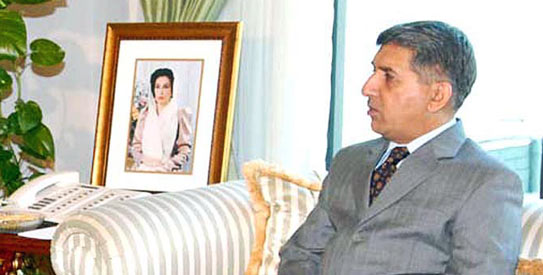
WASHINGTON: During the ISI chief’s meetings in Washington, senior US officials have assured Pakistan of a greater role in the Afghan reconciliation process, diplomatic sources told Dawn.
According to these sources, intelligence cooperation, reconciliation in Afghanistan and the dispute over visas dominated the talks during Lt-Gen Shuja Pasha’s one-day stay in the US capital.
The two issues highlighted by the media – restoration of US military aid to Pakistan and the release of a Pakistani helper of the CIA – were not discussed, the sources said.
(Reuters quoted a US official as having said “the discussions today between General Pasha and the acting director of the Central Intelligence Agency went very well. They agreed on a number of steps that will improve Pakistani and US national security”. A senior official at the Pakistani embassy in Washington said: “Both sides were able to agree on the way forward in intelligence. This visit has put the intelligence component back on track completely. We have had difficulties since May 2 operation in Abbottabad. Those difficulties are being addressed”).
Shakil Afridi, a physician, allegedly helped the CIA trace Osama bin Laden in Abbottabad.
“Senior US and Pakistani generals are already discussing the aid issue in Islamabad,” a senior diplomatic source told Dawn. “And issues like the release of a mole are not discussed in such high-level meetings.”
Gen Pasha, who left for Pakistan on Thursday evening, met acting CIA Director Michael J. Morell, Deputy National Security Adviser Gen Douglas Lute and Ambassador Mark Grossman, the US special envoy for Pakistan and Afghanistan.
Another important decision taken at the meetings was to avoid using the media for “putting pressure on Pakistan before sensitive talks”, said a source while pointing out that a series of official leaks to the US media preceded Gen Pasha’s visit to Washington.
The sources said that while the US had already included Pakistan in its talks with the Taliban, “there’s a feeling in Islamabad that the Americans were preventing them from playing a more effective role”.
In the talks, the Americans “assured the Pakistanis that they not only recognised their interests in Afghanistan but also want them to play a larger role”.
The Pakistanis assured them that “they support the US-led process” and would use their influence “to ensure that the process succeeds”.
On the issue of visas for US security and intelligence officials, the two sides agreed on a framework which would allow the Americans to deploy their personnel in Pakistan. But the Americans also agreed to “work with the ISI and not against it”.
The two sides agreed to meet again for further talks on these proposals and the next meeting may soon be held in Islamabad.
The sources said that both the CIA and the ISI realised they needed each other to effectively defeat the militants and that’s why they wanted to create a mechanism for dealing with day-to-day issues.
During the talks, the Americans underlined their concern that sharing sensitive intelligence with Pakistan could be counter-productive.
The CIA seems convinced that the ISI had tipped the militants when they asked them to raid an explosives factory in North Waziristan. The ISI says the militants had already left the location before the Americans shared the information with them.
The ISI’s complaints revolved around their concern that the Americans had little regard for Pakistan’s territorial integrity, as they demonstrated during the May 2 raid on Osama bin Laden’s compound. They fear that such violations can happen again “and sought and received assurance that this will not be repeated”.
The American concerns were further accentuated by reports from Islamabad that their decision to suspend $800 million of military aid had further convinced the Pakistani military and the ISI to decrease their dependence on the United States.
Diplomatic observers in Washington say that the decision to invite Gen Pasha to the US and send senior American generals to Islamabad followed a realisation among American policymakers that “they need to further engage Pakistan and not isolate it”, a point also highlighted this week by US media outlets like the Washington Post, CNN and the Los Angeles Times.













































Dear visitor, the comments section is undergoing an overhaul and will return soon.